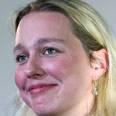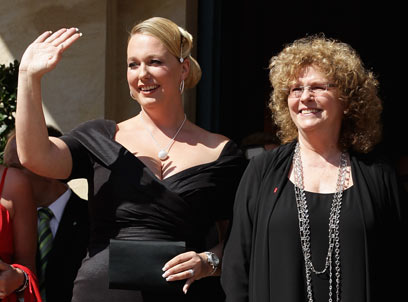
Wagner for the masses
German anti-Semitic composer's great granddaughter leads revolution in festival attracting thousands of music fans. 'You don't choose the family you are born into,' she tells Yedioth Ahronoth
It looks like a public screening of a soccer game, a popular political gathering or even a local beer festival. From the early afternoon hours, the place is flooded with people who have arrived to catch a good spot under the scorching sun.
Entire families come here, well equipped for the festive event: Light clothes, picnic baskets and sun protection measures. The weatherman promised a particularly summerlike weather, and was right – for a change.
At exactly 4 pm, when the fenced and guarded square is filled to the brim, it begins – not with a referee's whistle or a boring introductory speech, but with the first sounds of "The Valkyrie," the second piece in Richard Wagner's "Ring of the Nibelung" trilogy, which is broadcast live from the Bayreuth Festival's opera house, located several kilometers away.
At the same time, the opera is broadcast worldwide through the internet. Anyone can watch it on their personal computer for a symbolic fee of €15 (about $19), even two weeks after the actual show.
It's hard to believe, but this is the new, modern and revolutionary face of the Bayreuth Festival – one of the most traditional and conservative classical music events, which was held this year for the 99th time.
The fans of controversial German composter Richard Wagner – a brilliant musician, a known anti-Semite and the musical idol of Adolf Hitler and the Nazis – flock to the small Bavarian town every summer to watch new presentations of the mythological operas, which have remained inalienable assets of the German culture despite the problematic past of the composer, his family and the festival.
Uncle Hitler
Getting a ticket to the official festival is like winning the lottery. The prices, of course, are much more expensive. People wait years to be able to sit on an uncomfortable wooden chair inside the elegant festival hall, which was built in the end of the 19th century, inspired by an ancient Greek theater.
Throughout the years, the festival became an elitist, closed and distant event, very different from the original intentions of Wagner, who sought to bring the opera to the masses.
All this changed two years ago, when the festival management decided – in a move which sparked a lot of criticism among Wagner's fans – to launch public screenings and Web broadcasts. At the same time, they began organizing special musical events for children in order to train young generations of Wagner opera fans.
The person behind this revolution is Katharina Wagner, the famous composer's young great granddaughter, who together with her half-sister Eva Wagner-Pasquier has been directing the prestigious festival for the second year in a row.
Katharina, 32, is also responsible for another revolution: This summer, at the start of the festival, she announced the appointment of a committee of historians to look into her family and festival's ties with the Nazis. For this purpose, Katharina handed the two historians tasked with the sensitive mission hundreds of documents she had inherited from her father – Wolfgang Wagner, who restored and directed the festival after World War II and died earlier this year.
The historians were given access to all of the festival's archives as well. Katharina promised not only full transparency, but also swift work. The committee's conclusions are scheduled to be released by the events marking Richard Wagner's 200th birthday, which will take place in three years.
The Wagner family, especially Katharina's grandmother, Winifred – the strong-willed English wife of Siegfried Wagner, the composer's son – was one of Adolf Hitler's first and biggest supporters. Winifred got to know Hitler in 1923, the year he tried to gain control of the Bavarian government in a failed coup and was sent to jail. Winifred sent to his cell food parcels and stationery on which it is believed he had written his book "Mein Kampf."
Hitler and Winifred grew closer after Siegfried's death in 1930, and Germany was filled with rumors that the two were lovers and planned to marry. Hitler continued to visit the Wagner family home in Bayreuth after he was appointed chancellor and " Führer." The children of the family used to call him "Uncle Wolf." Bayreuth became an artistic pilgrimage center under the Nazi regime.

Katharina (L) with her half-sister Eva. 'Good relations' (Photo: Getty Images Bank)
Seventy years and two generations later, Katharina still lives in the shadow of that incriminating history. "Even when I was a child people would ask me if my grandmother was Hitler's lover, and I have no idea if it's true," she says in an interview to Yedioth Ahronoth.
"I didn't know them. I wasn't in their bedroom. The fact that I carry a certain surname doesn't mean I was there or that I know why a certain woman, who was my grandmother, was so attracted to that person."
What is it like carrying such a surname?
"That's a hard question to answer, as you don't choose the family you are born into. When you are born with such a name, you try to treat it as a normal thing, because you don't want to create the impression that you are unusual or not normal. Naturally, my family's past has had a role in my life."
What are your expectations from the historians' committee?
"I can't judge for them what the results of their work will be. My expectation is that after the research is completed we'll be able to say, 'Here is a historic question which was thoroughly clarified.'
"It's an issue that is always in the air, surrounded by great silence. I don't want them to say that we are hiding things. I asked the committee to submit interim reports regularly and publicly, so that people would be able to ask questions. I think that in regards to Winifred and her ties with the Nazis, many questions remain unanswered."
Do you understand the people in Israel who refuse to listen to or play Wagner music?
"Yes. You can't expect people to completely separate music from history. After all, Hitler and the Nazis misused Wagner's music. My father never spoke to me about that period, but I know he was on the side of those who opposed Hitler. He didn't like what his mother had done. In photos from that period he's always standing the furthest away from Hitler. We found a letter of his from those days in which he specifically says that Nazism was complete insanity."
Family feuds
Katharina's appearance is uncharacteristic of a director of such a prestigious festival. Instead of sitting in the festival auditorium alongside music fans stiffed in suits and elegant gowns, she wanders among the participants of the public screening in black leather pants, a t-shirt and a not-so-organized hairdo.
These screenings and working with the children are her life's work and she is very proud of their success. Katharina, an opera director herself, doesn’t talk much and doesn't like being asked personal questions.
"We decided to open up the festival in order to expose more people to the opera," she says. "We have to maintain this popular tradition of Wagner and make the opera more accessible, especially to the young audience. I'm not attempting to nurture a sort of ritual. There are people whose admiration for Wagner can make them threatening. The audience that comes here is mixed. People who love Wagner and people who have never listened to his work. An opera doesn't have to be elitist entertainment. You don't have to put on a suit to go see the opera."
The scandals provided by Katharina's family over the past few years can be used as great material for a soap opera. The family has been divided over feuds and mutual accusations, especially over the control of the festival. There were additional accusations about being banned from the family home and intentional concealment of the Nazi past.
Her father Wolfgang, who served as the festival's director longer than anyone else, was married twice. His second wife, Gudrun, was very involved in managing the festival and was considered her husband's successor. Her unexpected death three years ago led to an inheritance battle, which ended with the appointment of Katharina and her sister Eva, Wolfgang's daughter from his first marriage, as co-directors of the festival, bringing about partial domestic peace, at least between Wolfgang's daughters. Their brother, Gottfried, who publicly criticized his family's ties with the Nazis for years, continues to estrange himself almost completely.
"Only some of the family members take part in the tempestuous arguments in the family," says Katharina. "I stay away from all of this. I express my opinion only when they raise issues I am involved in. I have very good relations with my sister Eva."

Chancellor Merkel at Bayreuth Festival. 'Fascinating' (Photo: Getty Images Bank)
Katharina's management contract will end in 2015, when she will have to decide whether to stay in this role. "It will allow me to consider whether I have exhausted this matter or not," she says.
Her appointment to this senior role in such a young age was subject to criticism at the time. She can't remember the exact time she received the offer from her father to take over the festival.
"My father asked me, when I was very young, if I could imagine directing the festival some day," she reveals. "I think it was shortly after adolescence. Already then I said yes. My age has nothing to do with my ability to manage the festival. I grew up with this music, so you could say I have been dealing with it for 32 years."
One of the regular guests at the Bayreuth Festival is German Chancellor Angela Merkel, who arrives every year accompanied by her husband.
"I really like Merkel," Katharina says. "She used to come here even before she became chancellor. She's really interested in arts and music. You can have a fascinating conversation with her about these issues. She always has something to say."
What do you think about Daniel Barenboim?
"Barenboim has always been an innovative musician, an excellent conductor, and he has brought Wagner's music to a place it was very difficult to take it."
Would you like to do a Wagner opera in Israel?
"Gladly. But I'll come to Israel only if I'm invited. This is not something I can initiate."
- Follow Ynetnews on Facebook










